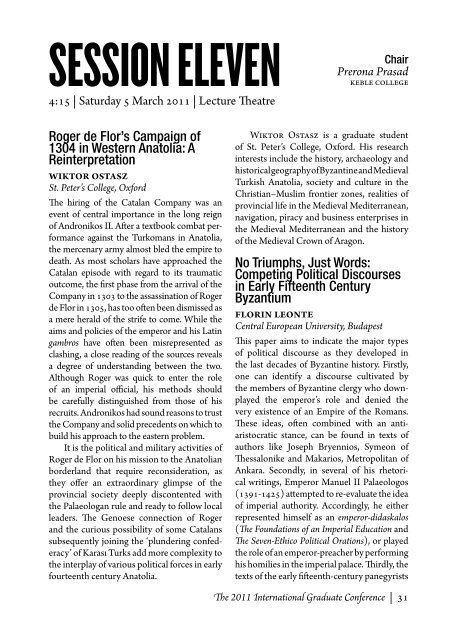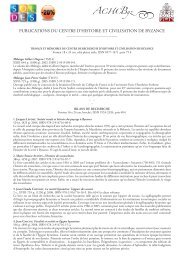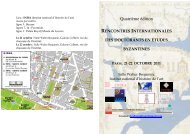booklet of abstracts - Oxford University Byzantine Society
booklet of abstracts - Oxford University Byzantine Society
booklet of abstracts - Oxford University Byzantine Society
You also want an ePaper? Increase the reach of your titles
YUMPU automatically turns print PDFs into web optimized ePapers that Google loves.
Session Eleven4:15 | Saturday 5 March 2011 | Lecture TheatreChairPrerona Prasadkeble CollegeRoger de Flor’s Campaign <strong>of</strong>1304 in Western Anatolia: AReinterpretationWiktor OstaszSt. Peter’s College, <strong>Oxford</strong>The hiring <strong>of</strong> the Catalan Company was anevent <strong>of</strong> central importance in the long reign<strong>of</strong> Andronikos II. After a textbook combat performanceagainst the Turkomans in Anatolia,the mercenary army almost bled the empire todeath. As most scholars have approached theCatalan episode with regard to its traumaticoutcome, the first phase from the arrival <strong>of</strong> theCompany in 1303 to the assassination <strong>of</strong> Rogerde Flor in 1305, has too <strong>of</strong>ten been dismissed asa mere herald <strong>of</strong> the strife to come. While theaims and policies <strong>of</strong> the emperor and his Latingambros have <strong>of</strong>ten been misrepresented asclashing, a close reading <strong>of</strong> the sources revealsa degree <strong>of</strong> understanding between the two.Although Roger was quick to enter the role<strong>of</strong> an imperial <strong>of</strong>ficial, his methods shouldbe carefully distinguished from those <strong>of</strong> hisrecruits. Andronikos had sound reasons to trustthe Company and solid precedents on which tobuild his approach to the eastern problem.It is the political and military activities <strong>of</strong>Roger de Flor on his mission to the Anatolianborderland that require reconsideration, asthey <strong>of</strong>fer an extraordinary glimpse <strong>of</strong> theprovincial society deeply discontented withthe Palaeologan rule and ready to follow localleaders. The Genoese connection <strong>of</strong> Rogerand the curious possibility <strong>of</strong> some Catalanssubsequently joining the ‘plundering confederacy’<strong>of</strong> Karası Turks add more complexity tothe interplay <strong>of</strong> various political forces in earlyfourteenth century Anatolia.Wiktor Ostasz is a graduate student<strong>of</strong> St. Peter’s College, <strong>Oxford</strong>. His researchinterests include the history, archaeology andhistorical geography <strong>of</strong> <strong>Byzantine</strong> and MedievalTurkish Anatolia, society and culture in theChristian–Muslim frontier zones, realities <strong>of</strong>provincial life in the Medieval Mediterranean,navigation, piracy and business enterprises inthe Medieval Mediterranean and the history<strong>of</strong> the Medieval Crown <strong>of</strong> Aragon.No Triumphs, Just Words:Competing Political Discoursesin Early Fifteenth CenturyByzantiumFlorin LeonteCentral European <strong>University</strong>, BudapestThis paper aims to indicate the major types<strong>of</strong> political discourse as they developed inthe last decades <strong>of</strong> <strong>Byzantine</strong> history. Firstly,one can identify a discourse cultivated bythe members <strong>of</strong> <strong>Byzantine</strong> clergy who downplayedthe emperor’s role and denied thevery existence <strong>of</strong> an Empire <strong>of</strong> the Romans.These ideas, <strong>of</strong>ten combined with an antiaristocraticstance, can be found in texts <strong>of</strong>authors like Joseph Bryennios, Symeon <strong>of</strong>Thessalonike and Makarios, Metropolitan <strong>of</strong>Ankara. Secondly, in several <strong>of</strong> his rhetoricalwritings, Emperor Manuel II Palaeologos(1391-1425) attempted to re-evaluate the idea<strong>of</strong> imperial authority. Accordingly, he eitherrepresented himself as an emperor-didaskalos(The Foundations <strong>of</strong> an Imperial Education andThe Seven-Ethico Political Orations), or playedthe role <strong>of</strong> an emperor-preacher by performinghis homilies in the imperial palace. Thirdly, thetexts <strong>of</strong> the early fifteenth-century panegyristsThe 2011 International Graduate Conference | 31





